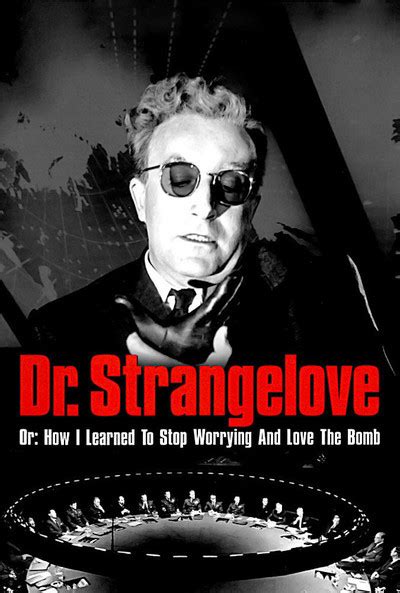Dr. Strangelove or: How I Learned to Stop Worrying and Love the Bomb
directed by: Stanley Kubrick, year: 1964
actors: Peter Sellers, George C. Scott, Sterling Hayden, Keenan Wynn, Slim Pickens
actors: Peter Sellers, George C. Scott, Sterling Hayden, Keenan Wynn, Slim Pickens

Description:
Dr. Strangelove or: How I Learned to Stop Worrying and Love the Bomb is a satirical black comedy that critiques the Cold War mentality and nuclear arms race between the United States and the Soviet Union. The film highlights the absurdities of war and political systems, as well as the potential for catastrophic outcomes when power is placed in the hands of fallible leaders. Through sharp wit and irony, it underscores the dangers of militarism and the fragility of peace.Keywords:
Government Critique, Satire, Black Comedy, Cold War, Politics, Nuclear, Deadpan, IdeologicalconflictWhy is Dr. Strangelove controversial?
Dr. Strangelove is controversial primarily due to its dark satire of nuclear war and Cold War tensions. Directed by Stanley Kubrick, the film uses absurdity and humor to critique the military and political leaders' irrationality regarding nuclear weapons. The portrayal of a former Nazi scientist, Dr. Strangelove, as an advisor to the U.S. government raises ethical questions about morality and the consequences of war. Its bold themes and comedic treatment of a grave subject matter sparked debate over the appropriateness of satire in depicting such serious issues.
What is Dr. Strangelove a parody of?
"Dr. Strangelove or: How I Learned to Stop Worrying and Love the Bomb" is a parody of Cold War politics and the absurdity of nuclear warfare. Directed by Stanley Kubrick, the film satirizes the irrationality of military and political leaders during this tense era, highlighting the dangers of mutually assured destruction. Dr. Strangelove, the titular character, embodies the extreme ideologies and dark humor surrounding the nuclear arms race, mocking the serious nature of such a catastrophic threat through absurdity and irony.
What is the song at the end of Dr. Strangelove?
The song at the end of "Dr. Strangelove or: How I Learned to Stop Worrying and Love the Bomb" is "We'll Meet Again," performed by Vera Lynn. This song plays over the film's final scenes, which juxtaposes the lighthearted and hopeful tone of the music with the grim imagery of nuclear destruction. The contrast serves to underscore the film's satirical commentary on the Cold War and the absurdity of nuclear conflict.
Is Dr. Strangelove still worth watching?
Yes, "Dr. Strangelove or: How I Learned to Stop Worrying and Love the Bomb" is still worth watching. Released in 1964, Stanley Kubrick's dark comedy remains a sharp satire of the Cold War and nuclear tensions, showcasing powerful performances, particularly by Peter Sellers in multiple roles. Its biting humor and clever dialogue continue to resonate, offering a critical perspective on military and political absurdities. The film's themes of paranoia and the human condition are timeless, making it relevant even today.
Explore More Categories:
Interconnectedness Beat Generation Cooking Dinosaurs Scientific Discovery Sin Entropy Supernatural Truth Seeking Bigfoot First Love Crime Investigation Dreamlike Identity Transformation Discovery Detective Sibling Rivalry Sisterhood Mobsters Racism Defection Quirky Humor Exploration Australian Outback Existential